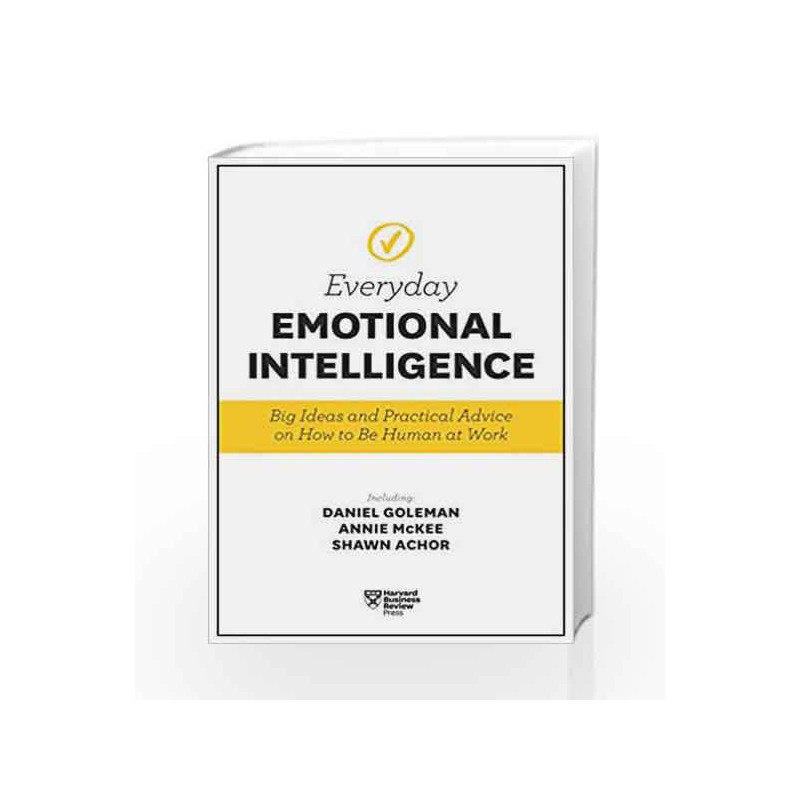Each book in the series offers proven research showing how our emotions impact our work lives, practical advice for managing difficult people and situations, and inspiring essays on what it means to tend to our emotional well-being at work. What is the best book on emotional intelligence? What are the best books about emotions?
HBR's Emotional Intelligence Series features smart, essential reading on the human side of professional life from the pages of Harvard. How to be human at work. Harvard Business Review is the leading destination for smart management thinking. If you are looking to get more out of the people working around you this book is for you. You will not find amazing literature, but that is not why you would be reading this book.
The trap that has ensnared Esther and her manager is a common one: They are defining emotional intelligence much too narrowly. Because theyre focusing only on Esthers sociability, sensitivity, and likability, theyre missing critical elements of emotional intelligence that could make her a stronger, more effective leader. A recent HBR article highlights the skills that a kin positive manager like Esther might lack: the ability to deliver difficult feedback to employees, the courage to ruffle feathers and drive change, the creativity to think outside the box. In the model of EI and leadership excellence that we have developed over years of studying the strengths of outstanding leaders, weve found that having a well-balanced array of specific EI capabilities actually prepares a leader for exactly these kinds of tough challenges. See full list on hbr.

We prefer EI, which we define as comprising four domains: self-awareness, self-management, social awareness, and relationship management. These include areas in which Esther is clearly strong: empathy, positive outlook, and self-control. But they also include crucial abilities such as achievement, influence, conflict management, teamwork and inspirational leadership.
These skills require just as much engagement with emotions as the first set, and should be just as much a part of any aspiring leaders development priorities. For example, if Esther had strength in conflict management, she would be skilled in giving people unpleasant feedback. And if she were more inclined to influence, she would want to provide that difficult feedback as a way to lead her direct reports and help them grow. Say, for example, that Esther has a peer who is overbearing and abrasive. Rather than smoothing over every interaction, with a broader balance of EI skills she could bring up the issue to her colleague directly, drawing on emotional self-control to keep her own reactivity at bay while telling him what, specifically, does not work in his style.

Bringing simmering issues to the surface goes to the core of conflict management. Esther could also draw on influence strategy to explain to her colleague that she wants to see him succee and that if he monitored how his style impacted those around him he would understand how a change would help everyone. Similarly, if Esther had developed her inspirational leadership competence, she would be more successful at driving change. A leader with this strength can articulate a vision or mission that resonates emotionally with both themselves and those they lea which is a key ingredient in marshaling the motivation essential for going in a new direction.
Indee several studies have found a strong association between EI, driving change, and visionary leadership. Formal 360-degree assessments, which incorporate systematic, anonymous observations of your behavior by people who work with you, have been found to not correlate well with IQ or personality, but they are the best predictors of a leaders effectiveness, actual business performance, engagement, and job (and life) satisfaction. Into this category fall our own model and the Emotional and Social Competency Inventory, or ESCI 36 a commercially available assessment we developed with Korn Ferry Hay Group to gauge the 12 EI competencies, which rely on how others rate observable behaviors in evaluating a leader. The larger the gap between a leaders self-ratings and how others see them, research finds, the fewer EI strengths the leader actually shows, and the poorer the business. Coaching is the most effective method for improving in areas of EI deficit.

Having expert support during your ups and downs as you practice operating in a new way is invaluable. Free Shipping On US Orders Over $10! Each of these ten articles have been hand selected to create a collection of impactful readings on building your capacity for emotional intelligence in your professional and personal lives.
Fundamental frameworks for. Each publication in the series provides proven research demonstrating our emotions affect our work lives. Practical suggestions for managing difficult people and situations, and also inspirational essays about what it means to occur to our psychological well-being on the job. Managing the human side of work. Research by Daniel Goleman, a psychologist and coauthor of Primal Leadership, has shown that emotional intelligence is a more powerful determinant of good.

Mauborgne , Clayton M. Great Used Books Starting at $3.
No comments:
Post a Comment
Note: Only a member of this blog may post a comment.